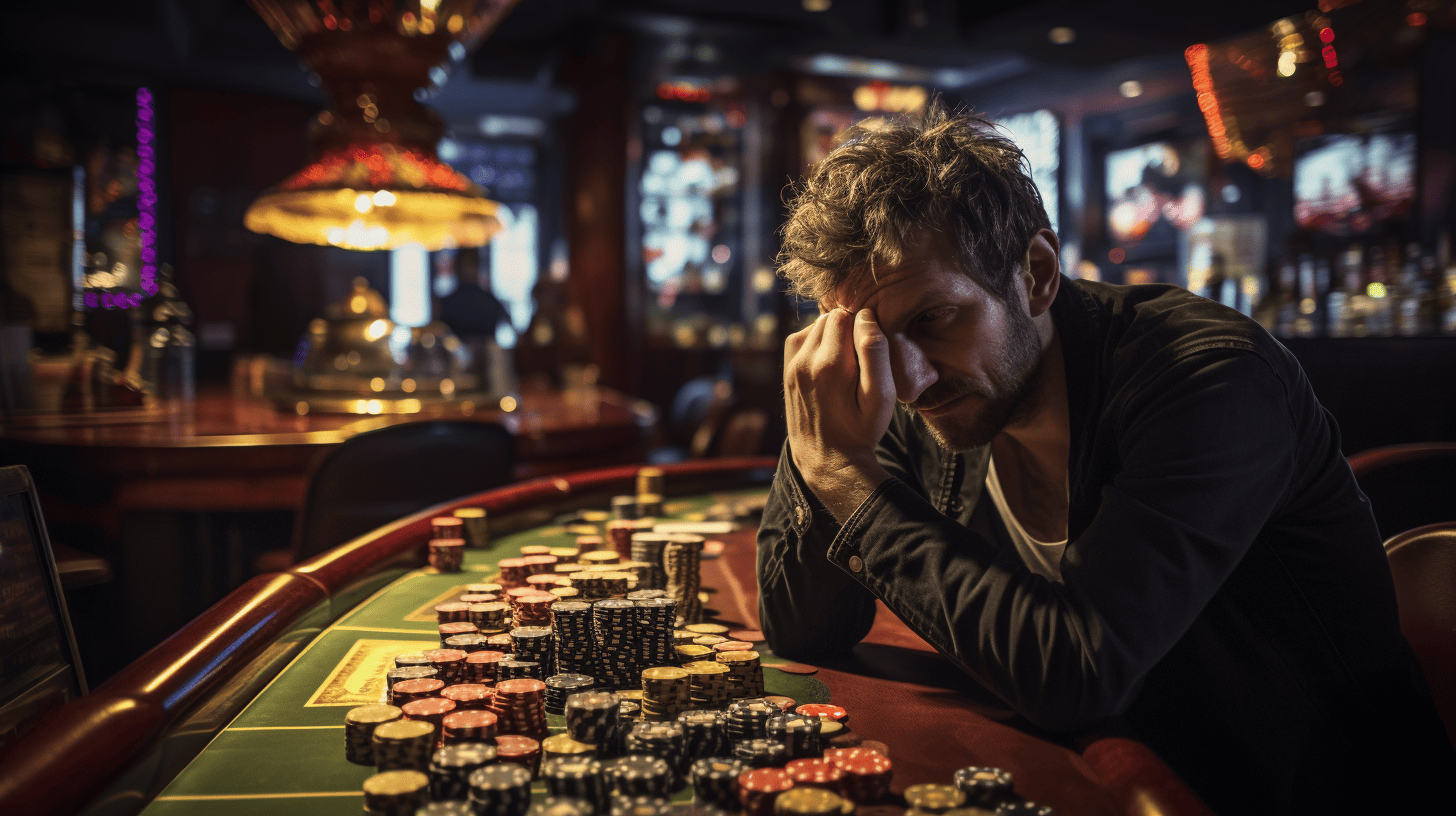Responsible gambling is a crucial aspect of enjoying online betting while ensuring the safety and well-being of individuals. It involves maintaining control over gambling activities and seeking help when necessary. In this comprehensive guide, we will explore the importance of responsible gambling, provide practical tips for safe betting, and offer resources for those seeking assistance with gambling addiction. Whether you're a seasoned bettor or a novice exploring online gambling for the first time, this guide will equip you with the knowledge to make informed decisions and promote a healthy gambling experience.

Understanding Responsible Gambling
Responsible gambling is a fundamental concept that promotes the enjoyment of betting activities while ensuring the well-being and safety of individuals. By understanding the principles of responsible gambling, bettors can make informed decisions, maintain control over their gambling activities, and seek help when needed. In this section, we will delve deeper into the importance of responsible gambling and provide insights into recognizing the signs of gambling addiction.
The Concept of Responsible Gambling:
Responsible gambling involves taking a proactive approach to betting by considering the potential risks and consequences associated with gambling. It emphasizes the need for individuals to make informed choices, maintain control over their gambling behavior, and prevent any negative impacts on their lives.
Recognizing the Signs of Gambling Addiction:
Gambling addiction, also known as problem gambling or compulsive gambling, is a serious condition that can have adverse effects on mental health, relationships, and finances. It is essential to be aware of the signs and symptoms of gambling addiction to address the issue promptly. Some common signs of gambling addiction include:
- Persistent thoughts about gambling
- Inability to control or stop gambling
- Gambling as a means to escape problems or emotions
- Neglecting personal or professional responsibilities due to gambling
- Borrowing money or engaging in illegal activities to fund gambling
- Relationship conflicts or strained relationships due to gambling behavior
- Feeling restless or irritable when attempting to cut down or stop gambling
Recognizing these signs and acknowledging the presence of a gambling addiction is the first step towards seeking help and embarking on the path to recovery.
The Impact of Gambling on Mental Health, Relationships, and Finances:
Excessive gambling can take a toll on various aspects of an individual's life. It can lead to significant negative consequences, including:
- Mental Health: Problem gambling is often associated with increased stress, anxiety, depression, and other mental health issues. The constant pursuit of winning and dealing with financial losses can result in emotional distress and impact overall well-being.
- Relationships: Gambling addiction can strain relationships with family, friends, and loved ones. Trust issues, financial disagreements, and emotional distance may arise due to the consequences of excessive gambling.
- Finances: Uncontrolled gambling can lead to severe financial hardships, including mounting debts, bankruptcy, and financial instability. The financial consequences of gambling can have far-reaching effects on an individual's life, affecting their ability to meet basic needs and achieve long-term financial goals.
The Role of Self-Awareness and Setting Limits:
Self-awareness plays a vital role in responsible gambling. It involves understanding one's own gambling behavior, recognizing personal limits, and taking necessary steps to stay within those limits. Setting limits on the amount of time and money spent on gambling can help individuals maintain control and prevent excessive or impulsive betting. Additionally, utilizing responsible gambling tools provided by online casinos, such as deposit limits, session time limits, and self-exclusion options, can further support responsible gambling practices.
By developing a comprehensive understanding of responsible gambling, recognizing the signs of gambling addiction, and taking proactive steps to maintain control, individuals can enjoy a safe and enjoyable betting experience while minimizing the risks associated with excessive gambling.

Tips for Responsible Gambling
In this section, we will provide practical tips and strategies to promote responsible gambling practices. By following these guidelines, individuals can enhance their betting experience and reduce the likelihood of developing gambling-related problems.
Set a Budget:
Before engaging in any form of gambling, it is crucial to establish a budget that outlines the maximum amount of money you are willing to spend. Stick to this budget and avoid exceeding your predetermined limit, even if you experience losses. Setting a budget helps to ensure that gambling remains an entertaining activity rather than a financial burden.
Time Management:
Manage your time wisely when gambling. Set specific time limits for each gambling session and adhere to them. It is easy to lose track of time when engrossed in betting activities, so setting a reminder or utilizing casino features that track your playing time can be beneficial. Remember to take breaks and engage in other non-gambling activities to maintain a healthy balance in your life.
Avoid Chasing Losses:
One common mistake among gamblers is chasing losses in an attempt to recover their money. However, this approach often leads to further losses and can exacerbate gambling-related problems. Accept that losses are part of the gambling experience and never wager more than you can afford to lose. Avoid the temptation to chase losses and instead focus on responsible gambling practices.
Educate Yourself:
Knowledge is key to responsible gambling. Take the time to learn about the games you are playing, including their rules, odds, and potential risks. Understanding the mechanics of each game allows you to make informed decisions and improves your overall gambling experience. Additionally, familiarize yourself with responsible gambling resources, such as helplines and support groups, which can provide assistance if needed.
Maintain Balance:
Gambling should be just one aspect of your life, not the sole focus. Engage in a variety of other activities, such as hobbies, socializing, and physical exercise, to maintain a balanced lifestyle. Having diverse interests and outlets for enjoyment helps to prevent excessive gambling and promotes overall well-being.
Seek Support:
If you suspect that you or someone you know is experiencing gambling-related problems, it is essential to seek help. Numerous resources and support networks are available to assist individuals struggling with gambling addiction. Reach out to helplines, counseling services, or support groups specializing in gambling addiction to access the support you need. Remember, seeking help is a sign of strength and a proactive step towards regaining control.
By implementing these tips for responsible gambling, individuals can enjoy betting activities in a safe and controlled manner. It is important to prioritize personal well-being, make informed decisions, and seek help when necessary to ensure a positive and enjoyable gambling experience.

Recognizing and Addressing Gambling Addiction
While most individuals can engage in gambling responsibly, it is essential to be aware of the signs of gambling addiction and know how to address the issue if it arises. This section will provide information on identifying the signs of gambling addiction and offer resources and strategies to help those affected.
Recognizing the Signs of Gambling Addiction:
Gambling addiction, also known as compulsive gambling or gambling disorder, is a serious condition that can have detrimental effects on an individual's life. It is important to be able to recognize the signs of gambling addiction to take appropriate action. Some common signs include:
- Preoccupation with gambling, constantly thinking about past gambling experiences or planning future gambling activities.
- Increasing the frequency or amount of money wagered to achieve the desired excitement or "high."
- Restlessness or irritability when attempting to reduce or stop gambling.
- Repeated unsuccessful attempts to control, cut back, or stop gambling.
- Gambling to escape from problems or relieve feelings of stress, anxiety, or depression.
- Lying to family members or loved ones about the extent of gambling involvement.
- Jeopardizing relationships, careers, or educational opportunities due to gambling.
If you or someone you know exhibits these signs, it may be an indication of a gambling addiction and should be addressed promptly.
Seeking Professional Help:
Addressing gambling addiction often requires professional assistance. Various treatment options are available to support individuals in overcoming their addiction. Some effective approaches include:
- Therapy: Cognitive-Behavioral Therapy (CBT) is commonly used to treat gambling addiction. It helps individuals identify and change negative thought patterns and behaviors associated with gambling.
- Support Groups: Joining support groups, such as Gamblers Anonymous, provides a safe and supportive environment for individuals to share their experiences, receive encouragement, and learn from others facing similar challenges.
- Counseling: Seeking counseling from a qualified therapist or counselor who specializes in gambling addiction can provide valuable guidance and support throughout the recovery process.
Helplines and Support Organizations:
Helplines and support organizations are valuable resources for individuals seeking assistance with gambling addiction. These services offer confidential and non-judgmental support, advice, and information. Some widely recognized helplines and support organizations include:
It is crucial to reach out to these helplines and support organizations to access the assistance needed for overcoming gambling addiction.
Self-Help Strategies:
In addition to seeking professional help and utilizing support services, there are self-help strategies that individuals can implement to support their recovery journey. These include:
- Self-Exclusion: Self-exclusion programs allow individuals to voluntarily ban themselves from participating in gambling activities at specific establishments or online platforms.
- Financial Management: Developing and adhering to a strict budget can help regain control over finances and prevent excessive gambling.
- Building a Supportive Network: Surrounding oneself with supportive and understanding individuals who encourage responsible behavior and offer emotional support can be instrumental in overcoming gambling addiction.
Remember, addressing gambling addiction requires determination, perseverance, and support. With the right resources and strategies, individuals can regain control over their gambling habits and lead fulfilling, balanced lives.
Conclusion:
Responsible gambling is about enjoying the thrill of gambling while maintaining control and awareness of the potential risks. By recognizing the signs of gambling addiction, seeking help when needed, and implementing responsible gambling practices, individuals can ensure a safe and enjoyable gambling experience.
Remember, if you or someone you know is struggling with gambling addiction, there are resources available to provide support and assistance. Reach out to helplines and support organizations dedicated to helping individuals overcome gambling addiction and regain control over their lives.
By practicing responsible gambling and promoting a culture of responsible gambling within the gambling community, we can create a safer and more enjoyable gambling environment for everyone involved.
